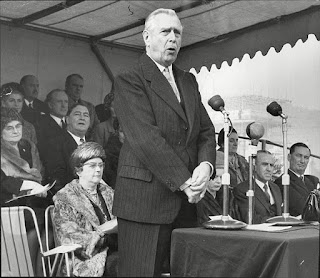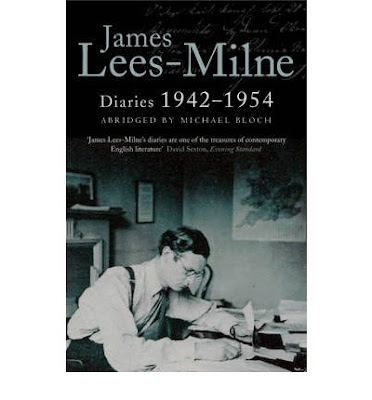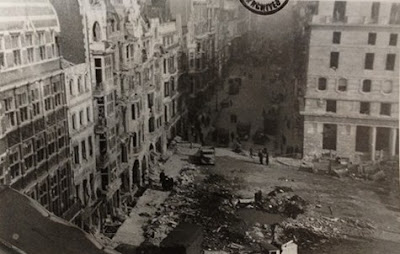As some of you may already know, I am a great reader of British diaries, letters and journals. There are many such volumes on the shelves of my personal library. From Pepys to Queen Victoria, I adore the immediacy of these personal writings, the way they drop you right into the lives of their authors and introduce you in a very intimate manner to people, places and times otherwise vanished. Recently, I came across the diaries of James Lees-Milne, which had somehow managed to escape my notice over the past few decades. JML was in at the very beginnings of the National Trust and the Georgian Society, amongst other things, and was advisor to the National Trust on which properties should be purchased and preserved by that body. In this capacity, JML travelled around the UK, poking his nose into a variety of stately homes and writing down for posterity his views on their architectural merits, their contents and their owners, often with wit and sometimes with chagrin, but always in a way that can’t help but to amuse the reader. In addition, JML lived in London and spent much of the 1930’s and 1940’s mixing with the Bright Young Things, various celebrities and writers and members of the Royal Family. No doubt you’ll appreciate that all of this makes for great fodder in the diary of someone who had a keen observational eye and a talent for first person prose. To read more about the accomplishments of James Lees-Milne, you will find the 1997 obituary that ran in The Independent here.
You’ll understand when I tell you that I was prepared to like these Diaries before I’d read Page 1, but I wasn’t prepared to find that so many of the entries would resonate with me on a personal level.
Tuesday, 17th February, 1942
Dined with Harold Nicolson and Jamesey at Rules. We talked about Byron’s sex life . . . .
Do you mean to say that other people sit around various London venues discussing the sex lives of dead people? Granted, in my circle we tend to focus on Brummell’s sex life, but close enough, what? And then there’s this entry –
Wednesday, 13th October, 1948
This evening I dined with the John Wyndhams. . . . After dinner, when the women left, talk was about how little we know of the everyday life of our ancestors in spite of George Trevalyan’s history. Jock Colville suggested we ought to go home tonight and write down in minute detail how we drove to the Wyndham’s door, left our car at the kerb, its doors firmly locked, rang the bell, were kept waiting on the doorstep, how we were received by a butler wearing black bow tie instead of white, what the hall smelt like, how the man took our coats and hats, putting them on a chest downstairs, and how he preceded us upstairs, one step at a time, etc., etc.
Positively uncanny. How often have myself and my friends, many of whom are writers of historical novels, lamented this very same thing and had almost the exact same discussion? By this time I was finding the diaries so delicious that I had to call Victoria immediately.
“Hello.”
“Have you ever heard of James Lees-Milne? You must start reading him now. He’s our new best friend. Where has he been all of our lives? How could either of us not known about his existence before now?”
“Who?”
“James Lees-Milne. The National Trust guy. Friends with everyone, including the Mitfords. He and his friends used to sit around discussing Byron’s sex life.”
“James who?”
“Hang up. I’m emailing you the link to his Diaries now. On Kindle. Buy them.”
Of course, not all of the Diary entries are about such musings. As I’ve said, JML lived in London during this period and there is much to be found about the City, especially during wartime. Again, they resonated with me because much of JML’s London incorporates my London, i.e. the areas and places in London that I revisit and in which I feel most at home.
Thursday, 24th February, 1944
There is no doubt our nerves are beginning to be frayed. Frank telephoned this morning. I could tell by his voice he was upset. He said he was going to leave the Paddington area and thought Chelsea or Belgravia would be safer. I said I doubted whether the Germans discriminated to that extent. This evening I went to see a crater in the road, now sealed off, in front of St. James’s Palace. The Palace front sadly knocked about, the clock awry, the windows gaping, and shrapnel marks on the walls. A twisted car in the middle of the road. . . In King Street Willis’s Rooms (Almack’s) finally destroyed, one half having gone in the raid of (May) 1941 when I was sheltering in the Piccadilly Hotel.
Sunday, 18th June, 1944
At Mass at 11 there was a great noise of gunfire and a rocket. In the afternoon Stuart walked in and said that a rocket had landed on the Guards’ Chapel (Wellington Barracks) during service this morning, totally demolishing it and killing enormous numbers of Guards officers and men. Now this did shake me. After dining at the Churchill Club we walked through Queen Anne’s Gate, where a lot of windows with the old crinkly brown glass panes have been broken. In St. James’s Park crowds of people were looking at the Guard’s Chapel across Birdcage Walk, now roped off. I could see nothing but gaunt walls standing, and gaping windows. No roof at all. While I watched four stretcher-bearers carried a body under a blanket, a (air raid) siren went, and everyone scattered. I felt suddenly sick. Then a rage of fury against the war raged inside me. For sheer damnable devilry what could be worse than this terrible instrument?
To think that Gunter’s and Almack’s had managed to survive until the War. In fact, JML was a patron of Gunter’s –
Saturday, 16th June, 1945
This morning the telephone man came to Alexander Place to say he would install my telephone on Monday . . . the bath however is still unattached to the pipes. The house painter and I picnic together. I leave the house each morning at 7.30 to bathe, shave and breakfast at Brooks’s, where I virtually live. In Heywood’s shop I met Diana (nee Mitford) Mosley and Evelyn Waugh with Nancy (Mitford). I kissed Diana who said the last time we met was when I stayed the night in Wootton Lodge, and we both wept when Edward VIII made his abdication broadcast. I remember it well, and Diana speaking in eggy-peggy to Tom Mosley over the telephone so as not to be overheard. . . . We all lunched together at Gunter’s. . . .
 |
| Brooks’s Club, St. James’s Street |
Lees-Milne stirs the heartstrings of every Anglophile with this entry –
Saturday, 17th June, 1944
Worked in Brooks’s library this afternoon. I am always happy in this stuffy, dingy Victorian library, in which the silence is accentuated by the relentless ticking of the old, stuffy clock.. I love the old stuffy books on the stuffy brown shelves, books which nobody reads except Eddie Marsh, and he falls fast asleep over them. The very atmosphere is calculated to send one asleep, but into the gentlest, most happy, nostalgic dreams of ninetheenth-century stability, self-satisfaction and promise of an eternity of heavenly stuffiness, world without end. How much I adore this library, and club, nobody knows. May it survive Hitler, Stalin and all the beastliness which besets us.
As I said, JML travelled the length and breadth of the UK both for his National Trust work and in order to visit various friends and relations. His entries concerning the Duke of Wellington were of particular interest, especially as they illustrate the consequences which the burden of caring for the first Duke’s belongings could bring about –
Saturday, 15th April, 1944
I caught the 1.15 to Reading where Gerry Wellington met me at the station in his small car, for he gets twenty gallons a month for being a duke. . . the western front of Stratfied Saye house clearly shows it to date from Charles I’s reign . . . . the east front is not so regular as the west, and the terraces are deformed by messy Edwardian flower beds. Gerry, who hates flowers, will soon have them away . . . Having eaten little luncheon I was famished, but tea consisted of only a few of the thinnest slices of bread and butter imaginable. After tea we did a tour of the inside of the house, beginning with the hall. When my stomach started to rumble with hunger Gerry looked at it with a reproachful air, and said nothing. It went on making the most awful noise like a horse’s. The hall has a gallery along the wall opposite the entrance. The open balusters were boxed in so as to prevent the servants being seen from below by the visitors. Gerry’s mother used to say that nothing of them was visible except their behinds, as they crouched and bobbed across the gallery. . . . the dining room is shut up, all the Apsley House pictures being stored there for the war, and valued at a million pounds, so G. says. . . . After dinner, at which there were no drinks except beer, (Gerry) showed me his grandfather’s collection of gems and intaglios, mounted on long, gold chains. When held against the oil lights, some of the stones were very beautiful. G. is very fussy over the key bunches, everything being carefully locked up. He has a butler, cook and two housemaids, and a secretary, Miss Jones. The last has meals with him during the week, and nearly drives him mad with her archness. `Aren’t you naughty today?’ she says. She is unable to type, so when he wishes to dispatch a letter not written by himself, he types it and gives it to her to sign.
 |
| Gerald Wellesley, 7th Duke of Welligton |
and
Sunday, 26th June, 1948 (at Stratfield Saye)
Lady Hudson and Lady Granville came to tea, and Lady G. suddenly developed St. Vitus’s dance and jangled the cup in her saucer, spilling scalding tea through a thin silk dress on to her knees, and smashing the saucer to smithereens. Gerry leapt up, seized the table upon which a few drops of the tea had sprinkled and rushed away with it to have the surface polished. He made not a gesture of help or sympathy to poor Lady Granville who was in considerable pain and distress. Typical Gerry behaviour. He never lets one down. His patent anxieties about his possessions bring these catastrophes about . . . . .
Below are just three more examples of JML’s entries on stately homes that afford us an insight onto a bygone way of life –
Thursday, 4th May, 1944
Martineau and I lunched at the Hyde Park Hotel with Lord Braybrooke, who has recently succeeded two cousins (killed on active service), inheriting the title and Audley End (House, Essex). He is a bald, common-sensical, very nice business man of 45, embarrassed by his inheritance. At his wit’s end what to do with Audley End. Who wouldn’t be? It was arranged that Martineau and I would visit the house with him in June. It is requisitioned by the Army and used for highly secret purposes, so that even he is not allowed into the rooms except in the company of a senior officer. Consequently he hardly knows the way round his own house. . . .
Saturday, 25th August, 1945
Describing a journey to Birr Castle – I woke at 5.45 and at 6.45 the car ordered by Michael Rosse called for me. It picked him up in Mount Street and drove us to Euston for the 8.15 to Holyhead. Travelled in comfort and ease. . . . After a smooth crossing we reached Kingstown at 7.30. I was at once struck by the old-fashioned air of everythng: horse-cabs on the quay, cobbled streets with delicious horse-droppings on them. Met by a taxi come all the way from Birr, for 8 pounds. Letter of greeting from Anne to Michael. Vodka for Michael and me in the car. We drove straight through Birr. Even through the closed windows of the car I caught the sweet smell of peat in the air. Curious scenes, ragged children on horses drawing old carts along country lanes. Our driver sounded his horn loudly through Birr, that pretty, piercing foreign horn. The gates of the castle shop open as if by magic. A group of people were clustered outside the gate. We swept up the drive. All the castle windows were alight, and there on the sweep was a large crowd of employeees and tenants gathered to welcome Michael home from the war. Anne, the two Parsons boys and Mr. Garvie the agent on the steps. Behind them Leavy the butler, the footman, housekeeper, and six or seven maids. A fire blazing in the library and everywhere immense vases of flowers. We heard Michael make a short speech from the steps, followed by cheers and `For he’s a jolly good fellow,’ a song which always makes me go hot and cold, mostly hot. The crowd then trooped off to a beano and drinks, while we sat down to a huge champagne supper at 11 o’clock.
Sunday, 1st August, 1948
Debo and Andrew (Hartington)(later 11th Duke and Duchess of Devonshire) drove me to Chatsworth this morning. The site of the house, the surroundings unsurpassed. The grass emerald green as in Ireland. The Derwent river, although so far below the house, which it reflects, seems to dominate it. Black and white cattle in great herds. . . . We wandered through the gardens, greyhounds streaming across the lawns. Andrew turned on the fountain from the willow tree. Water not only drips from the tree but jets from nozzles all round. The cascade not working this morning, but will be turned on for the public this afternoon. At present the great house is empty, under covers and dustsheets. Next year the state rooms are to be shown . . . As a couple the Hartingtons seem perfection – both young, handsome, and inspired to accomplish great things . . . Both full of faith in themselves and their responsibilities. She has all the Mitford virtues and none of the profanity. I admire them very much.
The Diaries are full of entries that shed light on the many facets to Lees-Milne’s personality, from the profound –
Wednesday, 30th November, 1949 (upon the death of his father after a long illness)
The very worst thing about death are the disprespect, the vulgarity, the meanness. God should have arranged for dying people to disintegrate and disappear like a puff of smoke into the air. There are many other scraps of advice I could have given him.
to the stingingly comic –
Sunday, 14th November, 1948
Newman, the hall porter at Brooks’s, told me I would be surprised if I knew which members, to his knowledge, stole newspapers out of the Club. I said, `You must not tell me,’ so he promptly did.
I urge you, as I urged Victoria, to waste no time in securing yourself a copy of James Lees-Milne’s Diaries. Victoria, I’m pleased to say, took my advice and read the Diaries – she loved them, too. Do let me know what you think when you’re finished with them.



Well, this is a must read. I am in the middle of reading about the Mitford women (The Sisters), and James Lees-Milne's name pops up quite a bit, and as you show in these excerpts, he was obviously close with some of them. But, OMG, how absolutely dreadful to read of his experiences during the War, even though it is wonderful he recorded his first-hand impressions, still, it is so sad. If more people living today knew the sacrifices that EVERYONE made during that time, they'd shut up about their own complaints. The Duke of Wellington being rationed 20 gallons of petrol because of who he was is an example. Quite extravagant for the times, but I wonder how many today would find that a "luxury"? I plan to find this book for my next read, seem appropriate that I would follow up the Mitford book with something by one of their contemporaries. . .
Oh, Cynthia, the diaries will be right up your alley – lots on all of the Sisters, mostly Debo and Diana. I think one reason he was so devoted to them was that he had been in love with their brother, Tom, who died in the War. Be prepared to tear through the war time diaries, they are unputdownable. I've since read Another Self, and the bio by Michael Bloch and am currently reading the diaries from the 70s and 80s. Such a wealth of gossip and insight into the people and the eras. Fabulous!